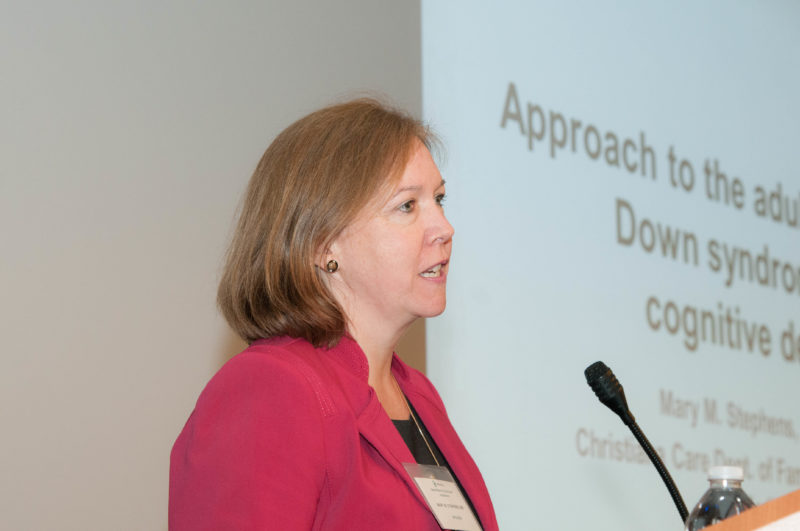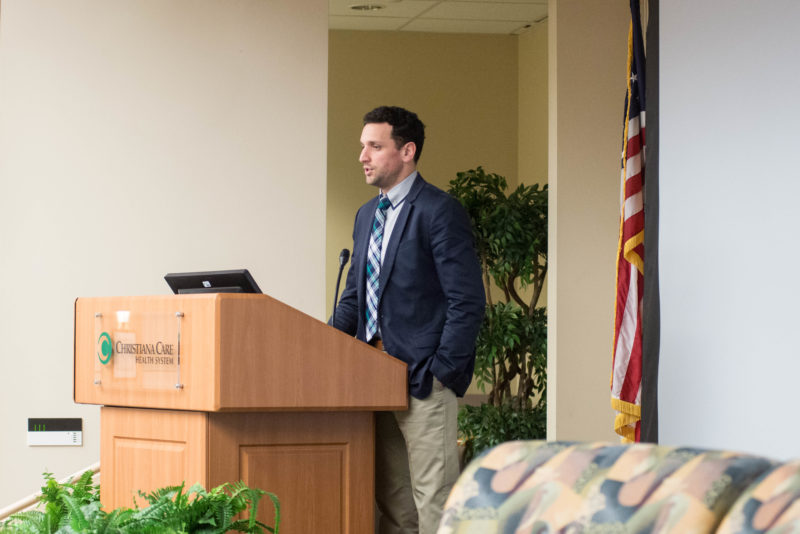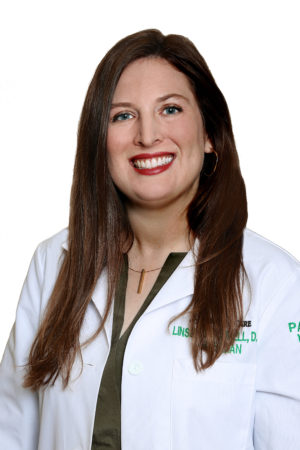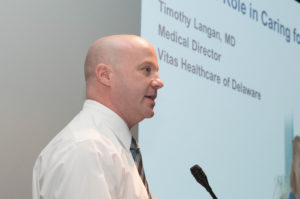At the third annual symposium of Christiana Care’s Swank Memory Care Center, March 10, health care providers learned about caring for adults are experiencing two kinds of early-onset dementia: chronic traumatic encephalopathy (CTE) and the Alzheimer’s dementia that develops in many adults with Down syndrome. Attendees also learned about end-of-life care options for older adults with various types of dementia.
The symposium was supported in part by the Junior Board of Christiana Care Inc.
Dementia, a pressing public health problem, is a multifaceted condition with many causes. While it is most commonly associated with older adults, young and middle-age adults also can suffer from the effects of cognitive decline.

Mary M. Stephens, M.D., MPH, physician co-leader of the Adult Down Syndrome Clinic, said Alzheimer’s disease pathology is present in nearly all adults with Down syndrome, although many will never develop the clinical symptoms of dementia. Dr. Stephens and co-leader Louis Bartoshesky, M.D., MPH, collaborate with Swank Center clinicians in the care of adults with Down syndrome and dementia. Diagnosing dementia in adults with Down Syndrome requires clinical experience and keen observation. For example, change in gait may be an early sign of cognitive decline, but many other treatable causes of gait change must also be considered. Dr. Stephens noted, for example, that gait changes might reflect such other factors as cervical spine problems or sore feet.
Medications, at times, can interfere with cognitive functioning. Patients who are taking unnecessary or poorly tolerated medications can appear confused or demented. One example of an unnecessary medication is the use of antipsychotic drugs to treat “self-talk” that can be a normal activity in people with Down syndrome.
“Self talk is a good way to problem-solve and can persist in adulthood in adults with Down syndrome,” she said. “In itself it is not a bad thing, but the quality of the self talk may be an indicator of the state of the patient’s well being – does the person with Down syndrome sound angry, afraid, sad?”

By contrast, young adults with previously normal cognitive functioning can be put at significant risk for early cognitive decline as a result of repetitive, sub-concussive or concussive head injuries. Often, people with CTE are misdiagnosed as having Alzheimer’s, said Michael L. Alosco, Ph.D., of Boston University’s Alzheimer’s Disease and CTE Center.
“These types of head injuries are very common in football,” he said. “Football linemen can have up to 1,500 of these hits to the head in a single season. We are seeing a relationship between hitting your head a bunch and problems with clinical function later in life.”

CTE was first described in 1928 in boxers, who were described as “punch drunk.” The condition is characterized by lesions that develop around small blood vessels in an irregular pattern in the brain. Football players who experience their first tackle before age 12 and who have little recovery time between hits are at higher risk.
Alosco said preventive measures, such as eliminating heading drills in soccer, will help to reduce cases of CTE. He also called for the development of objective biomarkers so providers can intervene early and slow progression of the disease.
The symposium concluded with a panel discussion about end-of-life care options for people with dementia.
Palliative care for adults with dementia should include the whole family, said Linsey O’Donnell, D.O., medical director, Community Based Supportive & Palliative Care. She recommends incorporating the patient’s personal joys and goals of care into the end-of-life plan of care.

Mark Komrad, M.D., psychiatrist and chair of ethics at Sheppard Pratt Health System in Maryland, talked about a growing trend in Europe of euthanasia performed by physicians at the request of their patients with dementia. He said 6 percent of all deaths in Belgium are now caused by euthanasia; one in four of those patients have dementia. In Holland, legislation is in process that would permit pharmacies to dispense over-the-counter euthanasia medication. He expressed deep concern that the rights of patients with dementia are being eroded and encouraged providers to be vigilant regarding attempts to introduce euthanasia laws in the United States.
“It has transformed me into an activist,” he said.

Timothy Langan, M.D., medical director, VITAS Hospice, described the many benefits that hospice care offers in improving the quality of remaining life in terminally ill patients. Hospice care provides greater comfort, pain relief and emotional support to patients at the end of life, assisting those who face bereavement with a range of services that includes post-bereavement counseling.



